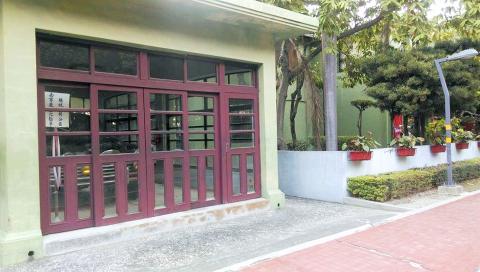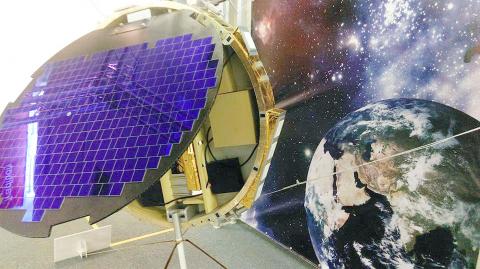On Monday, a group of dignitaries gathered at an opening ceremony of Tradition and Transformation: US—Taiwan Relations, 1979-2014 (傳承與蛻變:臺美關係1979-2014展), an exhibition marking 35 years of close cooperation between Taiwan and the US since the passage of the Taiwan Relations Act.
This act of the US Congress defined the non-diplomatic relations between the US and Taiwan, and established the American Institute in Taiwan (AIT). Tainan Mayor William Lai (賴清德) gave a speech at the event and expressed his deep appreciation to the US for facilitating stability and peace, which has helped Taiwan to prosper as a democracy.
STRONG FRIENDSHIP

Photo: Tony Coolidge
In his opening speech, AIT Deputy Director Brent Christensen said the US and Taiwan have enjoyed a strong foundation of friendship that continues today.
“By displaying vintage photographs, historical documents, and other memorabilia, we hope this exhibit will demonstrate the breadth of programs and engagement that both the US and Taiwan have put into this relationship over the past 35 years,” Christensen said.
AIT Kaohsiung Branch Chief Robert DeWitt underscored the significance of the exhibit moving from Taipei to Kaohsiung.

Photo: Tony Coolidge
“[Kaohsiung] is the industrial heart of Taiwan, and it is fast becoming a cultural mecca of Taiwan as well,” DeWitt said.
He noted that National Sun Yat-sen University, which is hosting the exhibit, was the only university in Taiwan that has an “America Center.”
OPENING CEREMONY

Photo Courtesy of AIT
A tour of the modest exhibit in the olive green Chiang Kai-shek Former Residence Art Gallery (中山大學蔣公行館西灣藝廊) reveals related photographs, historical documents and memorabilia. Various panels display the many aspects of US-Taiwan relations, including commerce and trade, culture and education, defense and security and science and technology.
Also included are informative displays about a variety of important cooperative programs, including the Fulbright Taiwan (傅爾布萊特計畫) education exchange and the Megaports Initiative (大港倡議計畫), which monitors the port of Kaohsiung for unauthorized, dangerous cargo.
The largest, most impressive exhibit is dedicated to the Formosat-3 (福爾摩沙衛星三號), a climate-monitoring satellite that was built with cooperation between Taiwan and the US and deployed in 1995. The gallery houses a full-size replica of the satellite and a scale model of the delivery rocket.
Local residents and visitors to Kaohsiung are encouraged to visit the exhibit to get a glimpse of the scope of the cooperation between Taiwan and the US since 1979. It may surprise visitors how much behind-the-scenes cooperation there actually has been between the two governments, as the cooperative programs had not been widely publicized. By increasing awareness and understanding of their historic partnership with the US, Taiwanese visitors can appreciate what it has taken to maintain peace and stability.

On April 26, The Lancet published a letter from two doctors at Taichung-based China Medical University Hospital (CMUH) warning that “Taiwan’s Health Care System is on the Brink of Collapse.” The authors said that “Years of policy inaction and mismanagement of resources have led to the National Health Insurance system operating under unsustainable conditions.” The pushback was immediate. Errors in the paper were quickly identified and publicized, to discredit the authors (the hospital apologized). CNA reported that CMUH said the letter described Taiwan in 2021 as having 62 nurses per 10,000 people, when the correct number was 78 nurses per 10,000

As we live longer, our risk of cognitive impairment is increasing. How can we delay the onset of symptoms? Do we have to give up every indulgence or can small changes make a difference? We asked neurologists for tips on how to keep our brains healthy for life. TAKE CARE OF YOUR HEALTH “All of the sensible things that apply to bodily health apply to brain health,” says Suzanne O’Sullivan, a consultant in neurology at the National Hospital for Neurology and Neurosurgery in London, and the author of The Age of Diagnosis. “When you’re 20, you can get away with absolute

May 5 to May 11 What started out as friction between Taiwanese students at Taichung First High School and a Japanese head cook escalated dramatically over the first two weeks of May 1927. It began on April 30 when the cook’s wife knew that lotus starch used in that night’s dinner had rat feces in it, but failed to inform staff until the meal was already prepared. The students believed that her silence was intentional, and filed a complaint. The school’s Japanese administrators sided with the cook’s family, dismissing the students as troublemakers and clamping down on their freedoms — with

As Donald Trump’s executive order in March led to the shuttering of Voice of America (VOA) — the global broadcaster whose roots date back to the fight against Nazi propaganda — he quickly attracted support from figures not used to aligning themselves with any US administration. Trump had ordered the US Agency for Global Media, the federal agency that funds VOA and other groups promoting independent journalism overseas, to be “eliminated to the maximum extent consistent with applicable law.” The decision suddenly halted programming in 49 languages to more than 425 million people. In Moscow, Margarita Simonyan, the hardline editor-in-chief of the